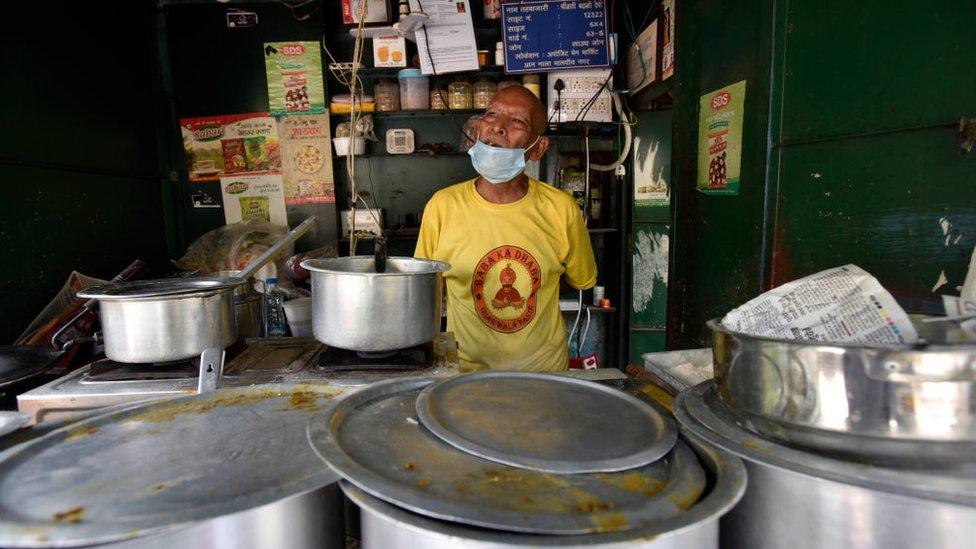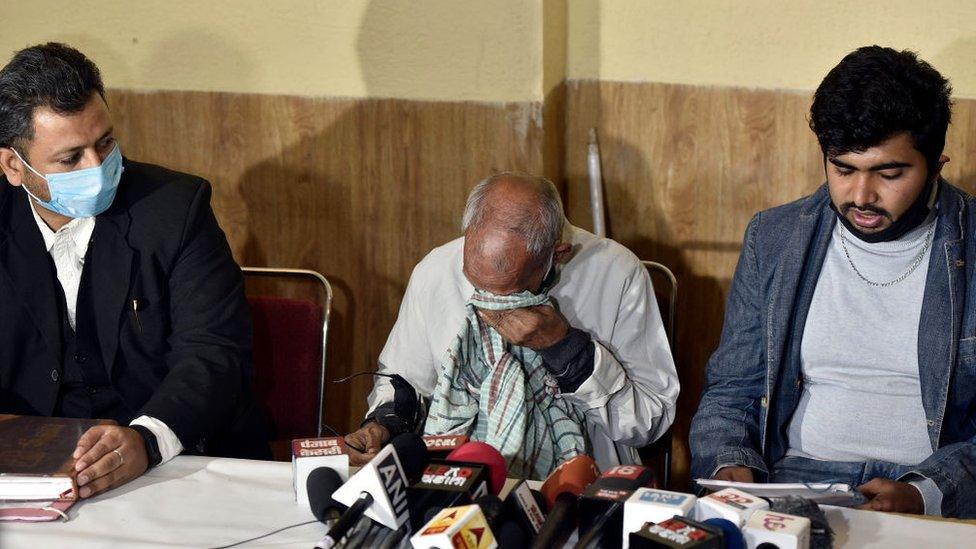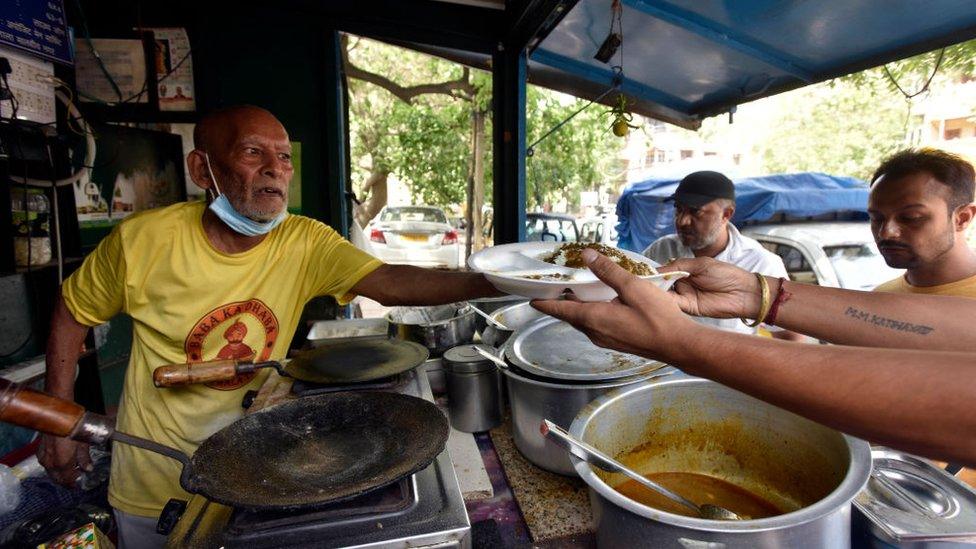Baba Ka Dhaba: The year in the life of a viral Delhi eatery owner
- Published

For Kanta Prasad, life has come full circle.
"We are not back to where we started, we have always been here," he told BBC Hindi, external.
The 80-year-old, whose fortunes changed with a viral tweet last year, is again at his roadside eatery in India's capital Delhi, just six months after he opened a new restaurant in the same locality.
Mr Prasad's food stall, Baba ka dhaba, grabbed headlines in October 2020 after a blogger posted a video of him crying about the lack of business because of the pandemic.
In the video, a tearful Mr Prasad showed the dishes they had prepared for the day, all unsold. When asked how much he had earned, he showed a few 10-rupee notes and broke down.
"Ever since the lockdown, life has been very difficult", he said.
The clip instantly propelled him to internet fame, turning him and his wife, Bima Devi, into local celebrities. Moved by his plight, people thronged the little-known eatery and help poured in through social media.
It got the attention of Bollywood stars, cricketers and even the chief minister of Delhi, Arvind Kejriwal.
Allow X content?
This article contains content provided by X. We ask for your permission before anything is loaded, as they may be using cookies and other technologies. You may want to read X’s cookie policy, external and privacy policy, external before accepting. To view this content choose ‘accept and continue’.

Mr Prasad and Ms Devi opened Baba ka dhaba in 1990. They served fresh, homemade meals of parathas, a flaky buttered bread, with a side of gravy, rice, and dal, a thick soup of lentils. A meal usually costs less than 50 rupees ($0.70; £0.50).
Street food is hugely popular in India, but the pandemic has hit vendors like them hard. As people stopped eating out, the couple struggled to make ends meet.
But Mr Prasad's predicament was not unique. The onset of the pandemic in India saw ironclad lockdowns across the country. Without a social safety net, small businesses and daily wage earners were left in limbo, ultimately triggering massive migration from big cities to rural heartlands.
Things changed overnight for Mr Prasad and his wife when blogger Gaurav Wasan shared the video of their hardships online.
People praised Mr Wasan for highlighting the plight of such eatery owners.
But Mr Prasad soon accused Mr Wasan of misappropriating funds collected in his name and even filed a police complaint against him.
Six months on, they seem to have made up. Mr Prasad thinks he made a mistake and Mr Wasan also said he had moved on.
But the viral video changed Mr Prasad's life. Customers flooded the now-famous Baba ka dhaba, TV crews showed up all the time, Mr Prasad found himself being interviewed a lot and generous donations poured in from across the country.

Mr Prasad shot to fame after the moving viral video

With the money, Mr Prasad was able to pay off debts, repair his dilapidated house and put food on the table for his family of eight.
In December, he decided to open a new restaurant, this time complete with a chef and a band of waiters.
But despite the initial fanfare, the business never took off and within three months, it was teetering on the edge of collapse.
"My monthly sales never crossed 40,000 rupees against a monthly expenditure of 100,000 rupees," Mr Prasad said.
The coronavirus pandemic has devastated economies around the world, pushing vulnerable people deeper into poverty. But in India, the economic fallout has weighed particularly heavily on small business owners like Mr Prasad.
Nearly 17 million daily wage labourers and small traders lost their jobs in May amid a devastating second wave, according to the Centre for Monitoring the Indian Economy (CMIE).
"There were far too many expenses - 35,000 rupees towards rent, 36,000 rupees to pay salaries of three employees," Mr Prasad told BBC Hindi. "Had I known it would be this difficult, I would've never opened a restaurant in the first place."
Facing losses, Mr Prasad finally decided to shut the place in mid-February. In May, he returned to his old food stall.

Mr Prasad's food stall sells homemade meals
Covid cases are on the decline now and several states have begun reopening, but experts fear this is only a lull before another wave if precautions are not followed properly.
Amid all this uncertainty, Mr Prasad said he is relieved he took the decision to shut his restaurant. "It is better this way. My earnings are much better now. I earn at least 1,300-1,400 rupees a day," he added.
While this is nowhere close to the sales the shop saw after its initial fame, Mr Prasad said it was enough for now. "People would want to know what we did with their money. We spent some building a house, some in the restaurant and some we have saved for our future."
"We are content where we are."
Additional reporting by Zoya Mateen

Indian grandpa cooks his way to YouTube glory
